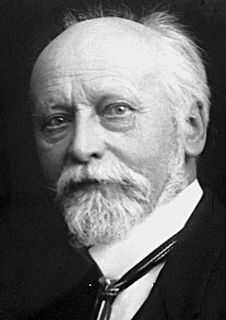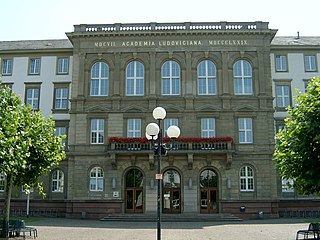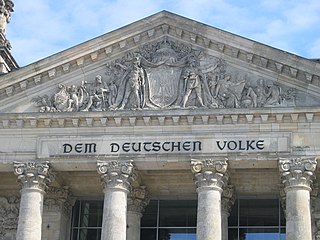Related Research Articles

The German Empire or the Imperial State of Germany, also referred to as Imperial Germany, the Second Reich, the Kaiserreich, as well as simply Germany, was the period of the German Reich from the unification of Germany in 1871 until the November Revolution in 1918, when the German Reich changed its form of government from a monarchy to a republic.

Otto Eduard Leopold, Prince of Bismarck, Duke of Lauenburg, known as Otto von Bismarck, was a conservative German statesman who masterminded the unification of Germany in 1871 and served as its first chancellor until 1890, in which capacity he dominated European affairs for two decades. He had previously been Minister President of Prussia (1862–1890) and Chancellor of the North German Confederation (1867–1871). He provoked three short, decisive wars, against Denmark, Austria, and France. Following the victory against Austria, he abolished the supranational German Confederation and instead formed the North German Confederation as the first German national state, aligning the smaller North German states behind Prussia, and excluding Austria. Receiving the support of the independent South German states in the Confederation's defeat of France, he formed the German Empire – which also excluded Austria – and united Germany.

Wilhelm Carl Grimm was a German author and anthropologist, and the younger brother of Jacob Grimm, of the literary duo the Brothers Grimm.
Pope Gelasius I was the bishop of Rome from 1 March AD 492 to his death on 19 November 496. He was probably the third and final bishop of Rome of Berber descent. Gelasius was a prolific author whose style placed him on the cusp between Late Antiquity and the Early Middle Ages. His predecessor Felix III employed him especially in drafting papal documents. During his pontificate he called for strict Catholic orthodoxy, more assertively demanded obedience to papal authority, and, consequently, increased the tension between the Western and Eastern Churches.

Ludwig Quidde was a German politician and pacifist who is mainly remembered today for his acerbic criticism of German Emperor Wilhelm II. Quidde's long career spanned four different eras of German history: that of Bismarck ; the Hohenzollern Empire under Wilhelm II (1888–1918); the Weimar Republic (1918–1933); and, finally, Nazi Germany. In 1927, he was awarded the Nobel Peace Prize.

German Romanticism was the dominant intellectual movement of German-speaking countries in the late 18th and early 19th centuries, influencing philosophy, aesthetics, literature and criticism. Compared to English Romanticism, the German variety developed relatively early, and, in the opening years, coincided with Weimar Classicism (1772–1805). In contrast to the seriousness of English Romanticism, the German variety of Romanticism notably valued wit, humour, and beauty.

Giessen, spelled Gießen in German, is a town in the German federated state (Bundesland) of Hesse, capital of both the district of Giessen and the administrative region of Giessen. The population is approximately 86,000, with roughly 44,000 university students.
The Völkisch movement was a German ethnic and nationalist movement which was active from the late 19th century through to the Nazi era. Erected on the idea of "blood and soil", inspired by the one-body-metaphor and the idea of naturally grown communities in unity, it was characterized by organicism, racialism, populism, agrarianism, romantic nationalism and–as a consequence of a growing exclusive and ethnic connotation–by antisemitism from the 1900s onward. German nationalists who were antisemitic considered the Jews to be an “alien race” who belonged to a different Volk than the Germans.
Karl Wilhelm Bücher was a German economist, one of the founders of non-market economics, and the founder of journalism as an academic discipline.

Friedrich Wilhelm August Fröbel or Froebel was a German pedagogue, a student of Johann Heinrich Pestalozzi, who laid the foundation for modern education based on the recognition that children have unique needs and capabilities. He created the concept of the kindergarten and coined the word, which soon entered the English language as well. He also developed the educational toys known as Froebel gifts.

Julius Pokorny was an Austrian-Czech linguist and scholar of the Celtic languages, particularly Irish, and a supporter of Irish nationalism. He held academic posts in Austrian and German universities.

Baron Wilhelm Emmanuel von Ketteler was a German theologian and politician who served as Bishop of Mainz. His social teachings became influential during the papacy of Leo XIII and his encyclical Rerum novarum.

Hans Friedrich Karl Günther was a German writer, an advocate of scientific racism and a eugenicist in the Weimar Republic and the Third Reich. He was also known as Race Günther (Rassengünther) or Race Pope (Rassenpapst). He is considered to have been a major influence on Nazi racialist thought. He taught at the universities of Jena, Berlin, and Freiburg, writing numerous books and essays on racial theory. Günther's Short Ethnology of the German People (1929) was a popular exposition of Nordicism. In May 1930, he was appointed to a new chair of racial theory at Jena. He joined the Nazi Party in 1932 as the only leading racial theorist to join the party before it assumed power in 1933.

The Württemberg family is a German royal family and dynasty from Württemberg.

Wilhelm Heinrich Riehl was a German journalist, novelist and folklorist.
Guy Stair Sainty, KC*SG is a British art dealer and author on nobility, royal genealogy, and heraldry.

Franz Joseph Maria Ludwig Anton Thassilo Prinz von Hohenzollern-Emden was a member of the Roman Catholic branch of the House of Hohenzollern. He was born as Prince Franz Joseph of Hohenzollern and adopted the surname Prinz von Hohenzollern-Emden in 1933.

The German noun Volk translates to people, both uncountable in the sense of people as in a crowd, and countable in the sense of a people as in an ethnic group or nation.
Volk is a surname. It means 'wolf' in several Slavic languages. The surname is relatively popular in Slovenia. Völk is a German language surname. Notable people with the surname include:

Johann Friedrich Wucherer was a German Lutheran pastor, theologian, author, and co-founder of the Society of Inner Missions with Wilhelm Löhe, based in Neuendettelsau.
References
- ↑ Wilhelm Volk - article in Catholic Encyclopedia
| | This article about a writer of non-fiction is a stub. You can help Wikipedia by expanding it. |